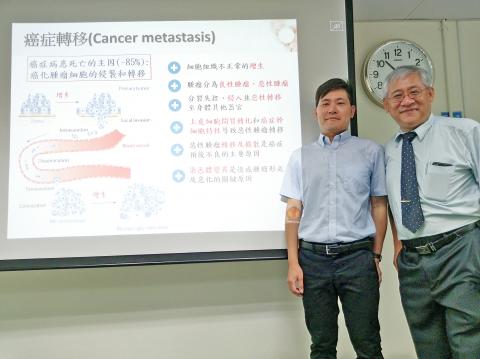Taiwanese researchers have become the first in the world to pin down a gene key to triggering metastasis of cancer cells, scientists at Academia Sinica announced yesterday.
The gene, known as paraspeckle component 1 — or PSPC1 — causes the metastasis of cancer in 60 percent to 70 percent of human patients, Jou Yuh-shan (周玉山), a research fellow at Academia Sinica’s Institute of Biomedical Sciences, told a news conference in Taipei.
In early-stage cancer, the condition affects only a localized part of the body, but when cancer spreads, the diagnosis changes to stage three or stage four, signifying that cancer cells are growing and spreading through blood vessels, he said.

Photo: Wu Liang-yi, Taipei Times
Stage three and stage four cancer is marked by the progression of cancer into other parts of the body, resulting in a deterioration of health and eventual death, he said.
After a decade of research, his team has identified PSPC1 as the gene that plays a crucial role in metastasis and controls the functions of other genes in cancer cells, such as inhibiting apoptosis, or natural cell death, he said.
Large-scale expression of PSPC1 is present in 60 percent to 70 percent of late-stage cancers, including breast, liver, lung and prostate cancers, he said.
PSPC1 not only augments the generation of cancer cells, but it also enables metastasis by imparting mobility and stem-cell like characteristics to normal cells, resulting in a superior growth rate and the drug resistance of cancer cells, he said.
Furthermore, the gene alters the cell’s cytokines to produce growth factor beta 1, also known as TGF-beta 1, which regulates apoptosis, he said.
In its altered state, the factor instead prolongs the lifespan and reproduction of cancer cells, he said.
The rate of PSPC1 expression is exceedingly low in healthy human beings, while high rates of its expression correspond with cancer that is reproducing and metastasizing, he said.
“In elucidating PSCS1 functionality and TGF-beta 1 behavior in metastasizing cancer, this research represents a major breakthrough,” Jou said.
The team’s study was published in the journal Nature Cell Biology on March 28.
The research team has identified an inhibitor of PSPC1 that has potential medical value, but its development for actual application in cancer treatment could take between 10 and 20 years, he said.

Taiwan is projected to lose a working-age population of about 6.67 million people in two waves of retirement in the coming years, as the nation confronts accelerating demographic decline and a shortage of younger workers to take their place, the Ministry of the Interior said. Taiwan experienced its largest baby boom between 1958 and 1966, when the population grew by 3.78 million, followed by a second surge of 2.89 million between 1976 and 1982, ministry data showed. In 2023, the first of those baby boom generations — those born in the late 1950s and early 1960s — began to enter retirement, triggering

One of two tropical depressions that formed off Taiwan yesterday morning could turn into a moderate typhoon by the weekend, the Central Weather Administration (CWA) said yesterday. Tropical Depression No. 21 formed at 8am about 1,850km off the southeast coast, CWA forecaster Lee Meng-hsuan (李孟軒) said. The weather system is expected to move northwest as it builds momentum, possibly intensifying this weekend into a typhoon, which would be called Mitag, Lee said. The radius of the storm is expected to reach almost 200km, she said. It is forecast to approach the southeast of Taiwan on Monday next week and pass through the Bashi Channel

NO CHANGE: The TRA makes clear that the US does not consider the status of Taiwan to have been determined by WWII-era documents, a former AIT deputy director said The American Institute in Taiwan’s (AIT) comments that World War-II era documents do not determine Taiwan’s political status accurately conveyed the US’ stance, the US Department of State said. An AIT spokesperson on Saturday said that a Chinese official mischaracterized World War II-era documents as stating that Taiwan was ceded to the China. The remarks from the US’ de facto embassy in Taiwan drew criticism from the Ma Ying-jeou Foundation, whose director said the comments put Taiwan in danger. The Chinese-language United Daily News yesterday reported that a US State Department spokesperson confirmed the AIT’s position. They added that the US would continue to

The number of Chinese spouses applying for dependent residency as well as long-term residency in Taiwan has decreased, the Mainland Affairs Council said yesterday, adding that the reduction of Chinese spouses staying or living in Taiwan is only one facet reflecting the general decrease in the number of people willing to get married in Taiwan. The number of Chinese spouses applying for dependent residency last year was 7,123, down by 2,931, or 29.15 percent, from the previous year. The same census showed that the number of Chinese spouses applying for long-term residency and receiving approval last year stood at 2,973, down 1,520,